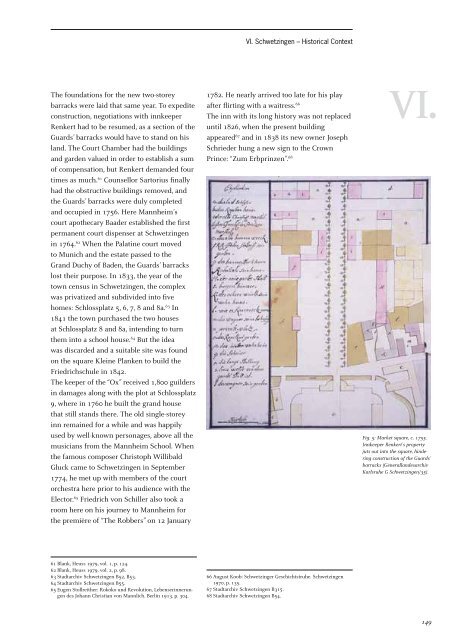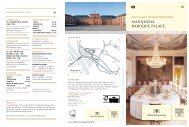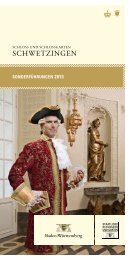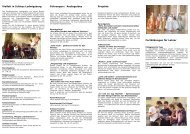Schwetzingen - Schlösser-Magazin
Schwetzingen - Schlösser-Magazin
Schwetzingen - Schlösser-Magazin
Create successful ePaper yourself
Turn your PDF publications into a flip-book with our unique Google optimized e-Paper software.
The foundations for the new two-storey<br />
barracks were laid that same year. To expedite<br />
construction, negotiations with innkeeper<br />
Renkert had to be resumed, as a section of the<br />
Guards’ barracks would have to stand on his<br />
land. The Court Chamber had the buildings<br />
and garden valued in order to establish a sum<br />
of compensation, but Renkert demanded four<br />
times as much. 61 Counsellor Sartorius finally<br />
had the obstructive buildings removed, and<br />
the Guards’ barracks were duly completed<br />
and occupied in 1756. Here Mannheim’s<br />
court apothecary Baader established the first<br />
permanent court dispenser at <strong>Schwetzingen</strong><br />
in 1764. 62 When the Palatine court moved<br />
to Munich and the estate passed to the<br />
Grand Duchy of Baden, the Guards’ barracks<br />
lost their purpose. In 1833, the year of the<br />
town census in <strong>Schwetzingen</strong>, the complex<br />
was privatized and subdivided into five<br />
homes: Schlossplatz 5, 6, 7, 8 and 8a. 63 In<br />
1841 the town purchased the two houses<br />
at Schlossplatz 8 and 8a, intending to turn<br />
them into a school house. 64 But the idea<br />
was discarded and a suitable site was found<br />
on the square Kleine Planken to build the<br />
Friedrichschule in 1842.<br />
The keeper of the “Ox” received 1,800 guilders<br />
in damages along with the plot at Schlossplatz<br />
9, where in 1760 he built the grand house<br />
that still stands there. The old single-storey<br />
inn remained for a while and was happily<br />
used by well-known personages, above all the<br />
musicians from the Mannheim School. When<br />
the famous composer Christoph Willibald<br />
Gluck came to <strong>Schwetzingen</strong> in September<br />
1774, he met up with members of the court<br />
orchestra here prior to his audience with the<br />
Elector. 65 Friedrich von Schiller also took a<br />
room here on his journey to Mannheim for<br />
the première of “The Robbers” on 12 January<br />
61 Blank, Heuss 1979, vol. 1, p. 124.<br />
62 Blank, Heuss 1979, vol. 2, p. 98.<br />
63 Stadtarchiv <strong>Schwetzingen</strong> B52, B53.<br />
64 Stadtarchiv <strong>Schwetzingen</strong> B55.<br />
65 Eugen Stollreither: Rokoko und Revolution, Lebenserinnerungen<br />
des Johann Christian von Mannlich. Berlin 1913, p. 304.<br />
VI. <strong>Schwetzingen</strong> – Historical Context<br />
1782. He nearly arrived too late for his play<br />
after flirting with a waitress. 66<br />
The inn with its long history was not replaced<br />
until 1826, when the present building<br />
appeared 67 and in 1838 its new owner Joseph<br />
Schrieder hung a new sign to the Crown<br />
Prince: “Zum Erbprinzen”. 68<br />
66 August Koob: Schwetzinger Geschichtstruhe. <strong>Schwetzingen</strong><br />
1970, p. 135.<br />
67 Stadtarchiv <strong>Schwetzingen</strong> B315.<br />
68 Stadtarchiv <strong>Schwetzingen</strong> B54.<br />
VI.<br />
Fig. 5: Market square, c. 1755.<br />
Innkeeper Renkert’s property<br />
juts out into the square, hindering<br />
construction of the Guards’<br />
barracks (Generallandesarchiv<br />
Karlsruhe G <strong>Schwetzingen</strong>/35).<br />
149









